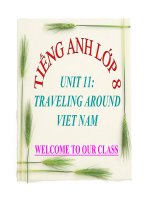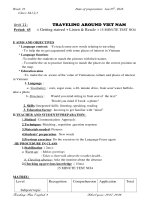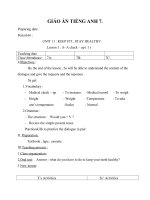Giáo án Tiếng Anh 8 unit 11: Traveling around Vietnam
Bạn đang xem bản rút gọn của tài liệu. Xem và tải ngay bản đầy đủ của tài liệu tại đây (126.18 KB, 10 trang )
GIÁO ÁN TIẾNG ANH LỚP 8.
Unit 11: Traveling around VIET NAM
Lesson 1/64: Getting started + Listen and read
A. Aim:
By the end of the lesson, students will be able to use some expressions to
express their interest.
*. Lexical item : Corn , crop , sugar cane , water buffalo.
*. Skill : Listening and reading .
*. Techniques : Practice in pairs and group.
*.Teaching aids: posters, pictures, tape.
B. Procedures:
I. Warm-up:
Brainstorm
Phong Nha cave
? Tell me places of interst in Vietnam?
Ha Long Bay
places of interst in
Vietnam
Hue citadel
- Ask ss to look at the pictures on p.98.
- Ask ss to match the places of interest in Vietnam with the right pictures.
II. Pre-reading:
1. Vocabulary:
- corn
(n) :
cây ngô
(visual)
- crop
(n) :
vụ mùa
(explanation)
- sugar cane
(n) :
cây mía
(visuals)
- water buffalo
(n) :
con trâu
(picture)
* Checking vocabulary: Rub out and Remember.
2. Pre-question:
- Hang on a chart with the questions on a board.
? Where does Hoa meet the Jones?
? Is it the first time The Jones have visited Vietnam?
? How do they travel to Hanoi?
? What would Tim like to do?
- Ask ss to work in pairs to answer the questions above.
- Let them read the dialogue on p.99 and check.
III. While-reading:
* T/ F statements (on textbook):
- Hang on the poster about T/ F statements on p.99-100
- Ask ss to read the dialogue again then choose T or F.
- Call ss to answer.
- Ask them to correct the false sentences.
T/ F:
1 .T 2. T 4. T 5. T
3. F: .... in a taxi
6. F : Not only rice and corn but also sugar canes are grown around Hanoi.
IV. Post-reading:
* Discussion:
- Ask ss to read the dialogue again, discuss with their friends then ask them to pick
out the sentences containing the situations mentioned below:
a/ To express interest:
I’d like you to meet my parents ....
It’s nice to meet you ....
It’s a great to be in Vietnam ....
I’d like to sit with Tim ....
b/ To express a request:
Would you mind sitting in the front seat .... ?
Would you mind if I took a photo?
V. Homework:
- Learn by heart vocabulary.
- Do exercise in workbook.
- Prepare for Speak.
Unit 11: Traveling around VIET NAM
Lesson 2/65: Speak + Language Focus 3, 4.
A. Aim:
By the end of the lesson, students will be able to make and respond to formal
requess using “mind” and make suggestions.
*. Grammar : Make request : Would you mind + V- ing / If I + V (past)
Do you mind + V-ing / If I + V ( present)
*. Lexical item : Revolutionary , botanical gardent , vegetarian , suggest.
*. Skill : Speaking.
*. Techniques : Practice in pairs and group.
*. Teaching aids: posters, pictures.
B. Contents:
* Warm-up:
Revision
I. Pre-speaking:
1. Vocabulary:
- revolutionary
(n):
cuộc cách mạng
- botanical garden
(n):
vườn bách thảo
(example)
- vegetarian
(n):
người ăn chay
(situation)
đề nghị, yêu cầu
(synonym)
- (to) suggest
:
(explanation)
* Checking vocabulary: What and where.
2. Dialogue:
Mr. John: It’s very nice here. Do you mind opening the window?
Nam:
Not at all.
Mr.John: Would you mind telling me where it is? I like it very much.
Nam:
So do I. It’s Long Bien bridge.
Mr.John: Would you mind if I took a photo with you?
Nam:
Yes, please.
* Form: Making a resquest
a/ Would you mind + V-ing/ if I + V(past) ?
b/ Do you mind + V-ing/ if I + V(present)?
* Use: to make respond to formal resquess.
? How do you reply?
No, I don’t mind
I’m sorry, I can’t
No, of course not
I’m sorry, thatis not possible
Not at all
I’d prefer you didn’t
Please do
II. While-speaking:
I’d rather you didn’t
- Have ss look at book on p.101.
? What’s student A going to do?
- Ask the tourist information officer to suggest where you could go.
? What’s student B going to do?
- Make suggestions about which places to visit.
- Model: Could you give me some information please?
Yes, please.
Would you mind if I....?
III. Post-speaking:
1. Mapped dialogue:
You
Excuse me!
Tourist officer
Yes?
I’d lkie to visit a market. Would you
Not at all
mind suggesting one?
How about going toThai Binh
market? It’s opens from about
5a.m to 8p.m
That sounds interesting. Thank you.
You are welcome.
- Put the dialogue chart on the board.
- Elicit the exchanges from ss and have them repeat.
- Open pairs: ask 3 pairs to demonstrate the dialogue.
- Closed pairs: have ss open the book on p. 101 and use the information to practice
other dialogues.
2. Language focus 3, 4.
* Make up dialogue:
- Ask ss to look at pictures on p.110
- Run through.
- Let ss look at “Request” on p.100 again then give request and response with each
picture
- Model with picture (e):
S1: Would you mind if I turned on the air conditional?
S1: No, of course not.
- Pair work.
- Ask 5 pairs to read out.
IV. Homework:
- Learn by heart vocabulary.
- Do exercises in workbook.
- Prepare for Listen.
Unit 11: Traveling around VIET NAM
Lesson 3/66: Listen + Language Focus 1, 2.
A. Aim:
By the end of the lesson, students will be able to develop listening for details about
the place directions and use “ed” and “-ing” participle.
*. Grammar : Present participle : S + V –ing . ( Active meaning )
Past participle :
S + V –ed . ( Passive meaning)
*. Skill : Listening.
*. Techniques : Practice in pairs and group.
*. Teaching aids: posters, a map, tape.
B. Procedures:
* Warm-up: Revision
I. Listening:
1. Pre-listening:
- Hang on a poster about the map on p.102.
- Ask ss to look at this.
- Run through the map.
- Ask ss to guess where the places on the map are.
2. While-listening:
- Get ss to listen to the tape and check their predictions.
- Open tape (twice).
- Listen and match the places in the box to their correct positions on the map.
- Ask them compare with their friends.
- Call ss go to the board and match.
- Open tape again.
- Listen again and correct.
* Matching:
a/ restaurant
b/ hotel
c/ bus station
d/ pagoda
e/ temple
3. Post-listening:
* Picture dictation:
- Review prepositions: next to, between, in the middle, beside, near,....
- Give ss instructions to draw:
1.There is a lake in the middle of the picture.
2.There is a house to the north of the lake.
3.There are some trees beside the house.
4.To the sound of the pond the is a highway.
5.There are some chickens next to the highway.
- Let ss listen several times.
- Ask them to show their pictures.
- Put an empty box on the board and have ss draw each instruction individually to
check.
II. Grammar:
* Presentation:
- Write examples on board:
+ The boy reading the book is Ba
+ The old lamp made in China is five dollars
* Form: a/ S + V-ing (present participle)
b/ S + V-ed (past participle)
* Use:
- A present participle (phrase) can be used as an adjective to qualify a noun with
active meaning.
- Apresent participle (phrase) can be used as an adjective to qualify a noun with
passive meaning.
III. Practice:
1. Word cue drill:
a/ Mr.Quang/ walking up the stair The man walking up the stairs is Quang.
b/ Miss Lien/ carrying a bag
c/ Nam/ talking to Miss Lien
d/ Ba/ sitting under the tree
e/ Lan/ standing by the table
f/ Nga and Hoa/ playing chess
- Have ss write sentences using the form (a) above.
2. Question-Answer drill:
- Have ss look at the picture on p. 109 make question and answer using the form
(b) above.
- Run through.
a/ The box painted green/ one dollar.
b/ Truck made from recycled cans/ $ 2
c/ Doll dressed in red/ $ 2
d/ Flowers wrapped in blue paper/ $ 1
e/ Toys kept in a cardboard box/ $10
- Model with cue (a): How much is the box painted green?
- The box painted green is one dollar.
- Work in pairs.
IV. Homework:
- Learn by heart vocabulary and form.
- Do exercise in workbook.
- Prepare for Read.









